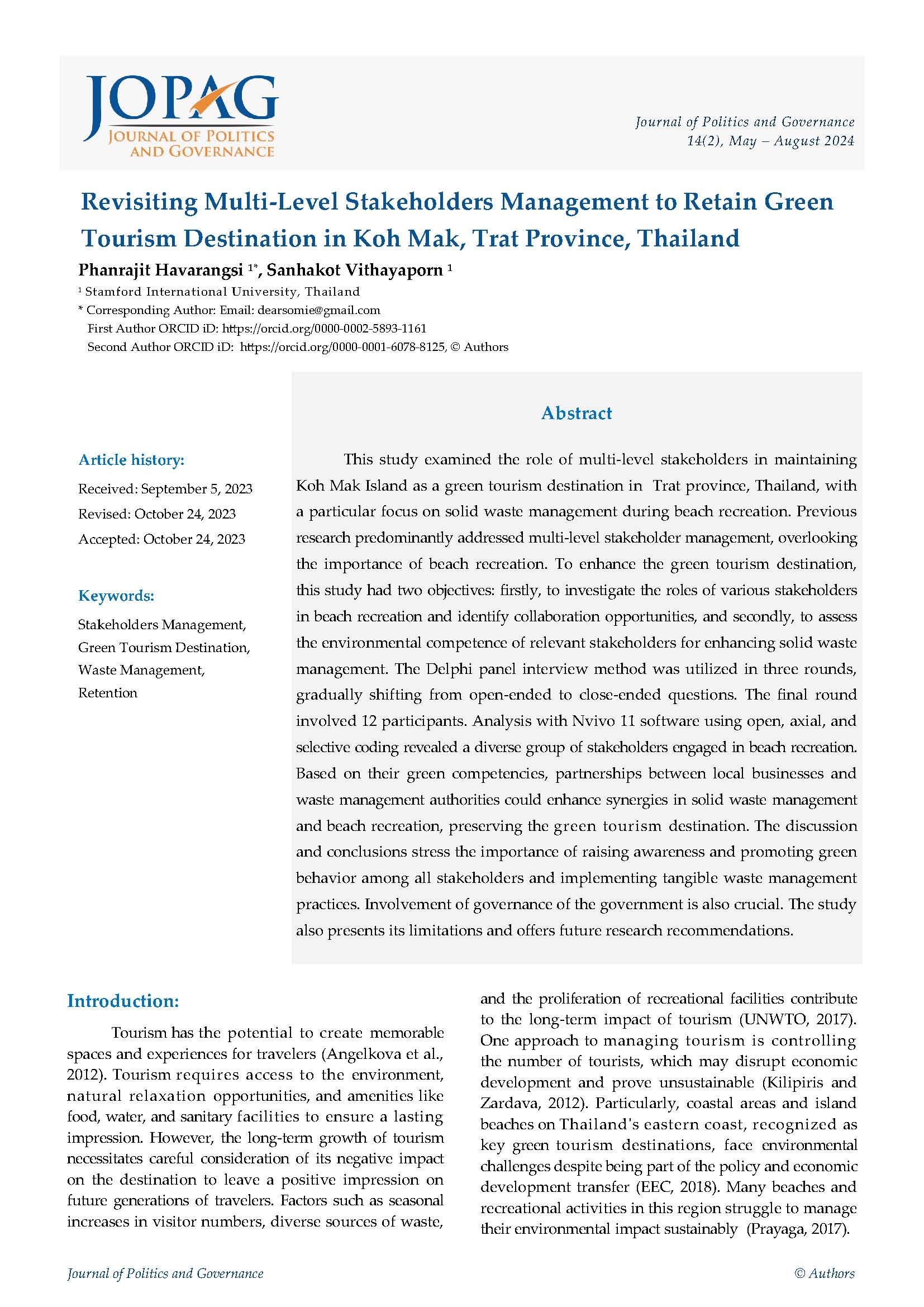Revisiting Multi-Level Stakeholders Management to Retain Green Tourism Destination in Koh Mak, Trat Province, Thailand
Main Article Content
Abstract
This study examined the role of multi-level stakeholders in maintaining Koh Mak Island as a green tourism destination in Trat province, Thailand, with a particular focus on solid waste management during beach recreation. Previous research predominantly addressed multi-level stakeholder management, overlooking the importance of beach recreation. To enhance the green tourism destination, this study had two objectives: firstly, to investigate the roles of various stakeholders in beach recreation and identify collaboration opportunities, and secondly, to assess the environmental competence of relevant stakeholders for enhancing solid waste management. The Delphi panel interview method was utilized in three rounds, gradually shifting from open-ended to close-ended questions. The final round involved 12 participants. Analysis with Nvivo 11 software using open, axial, and selective coding revealed a diverse group of stakeholders engaged in beach recreation. Based on their green competencies, partnerships between local businesses and waste management authorities could enhance synergies in solid waste management and beach recreation, preserving the green tourism destination. The discussion and conclusions stress the importance of raising awareness and promoting green behavior among all stakeholders and implementing tangible waste management practices. Involvement of governance of the government is also crucial. The study also presents its limitations and offers future research recommendations.
Article Details

This work is licensed under a Creative Commons Attribution-NonCommercial-NoDerivatives 4.0 International License.
References
Amasuomo, E., & Baird, J. (2016). The concept of waste and waste management. J. Mgmt. & Sustainability, 6, 88.
Angelkova, T., Koteski, C., Jakovlev, Z., & Mitrevska, E. (2012). Sustainability and competitiveness of tourism. Procedia-Social and Behavioral Sciences, 44, 221-227.
Bangkok Post. (2022). Koh Mak is sustainability. https://www.bangkokpost.com/life/travel/ 2408208/koh-mak-is-sustainable-success-story
Bellia, C., Scavone, V., & Ingrassia, M. (2021). Food and religion in Sicily-A new green tourist destination by an ancient route from the past. Sustainability, 13(12), 6686.
Cervantes, D. E. T., Martínez, A. L., Hernández, M. C., & de Cortázar, A. L. G. (2018). Using indicators as a tool to evaluate municipal solid waste management: A critical review. Waste management, 80, 51-63.
Demirbas, A. (2011). Waste management, waste resource facilities and waste conversion processes. Energy Conversion and Management, 52(2), 1280-1287.
El-Gohary, N. M., Osman, H., & El-Diraby, T. E. (2006). Stakeholder management for public private partnerships. International journal of project management, 24(7), 595-604.
Eskerod, P., & Huemann, M. (2013). Sustainable development and project stakeholder management: What standards say. International Journal of Managing Projects in Business, 6(1), 36-50.
Eskerod, P., Huemann, M., & Savage, G. (2015). Project stakeholder management-Past and present. Project management journal, 46(6), 6-14.
Furqan, A., Som, A. P. M., & Hussin, R. (2010). Promoting green tourism for future sustainability. Theoretical and empirical researches in urban management, 5(8 (17)), 64-74.
Font, X., & Tribe, J. (2001). Promoting green tourism: The future of environmental awards. International Journal of Tourism Research, 3(1), 9-21.
Hong, S. K., Kim, S. I., & Kim, J. H. (2003). Implications of potential green tourism development. Annals of Tourism Research, 30(2), 323-341.
Johnson-Cramer, M. E., Berman, S. L., & Post, J. E. (2017). Re-examining the concept of 'stakeholder management'. In Unfolding Stakeholder Thinking 2 (pp. 145-161). Routledge.
Jopp, R., Mair, J., DeLacy, T., & Fluker, M. (2015). Climate change adaptation: Destination management and the green tourist. Tourism Planning & Development, 12(3), 300-320.
Kilipiris, F., & Zardava, S. (2012). Developing sustainable tourism in a changing environment: issues for the tourism enterprises (travel agencies and hospitality enterprises). Procedia-Social and Behavioral Sciences, 44, 44-52.
Kumar, S., Smith, S. R., Fowler, G., Velis, C., Kumar, S. J., Arya, S., & Cheeseman, C. (2017). Challenges and opportunities associated with waste management in India. Royal Society Open Science, 4(3), 160764.
Law, A., De Lacy, T., McGrath, G. M., Whitelaw, P. A., Lipman, G., & Buckley, G. (2012). Towards a green economy decision support system for tourism destinations. Journal of Sustainable Tourism, 20(6), 823-843.
Law, A., DeLacy, T., & McGrath, G. M. (2017). A green economy indicator framework for tourism destinations. Journal of Sustainable Tourism, 25(10), 1434-1455.
Meidiana, C., & Gamse, T. (2010). Development of waste management practices in Indonesia. European journal of scientific research, 40(2), 199-210.
Mihalič, T. (2013). Performance of environmental resources of a tourist destination: concept and application. Journal of Travel Research, 52(5), 614-630.
Minelgaitė, A., & Liobikienė, G. (2019). Waste problem in European Union and its influence on waste management behaviours. Science of the Total Environment, 667, 86-93.
Pedrini, M., & Ferri, L. M. (2019). Stakeholder management: a systematic literature review. Corporate Governance: The International Journal of Business in Society, 19(1), 44-59.
Prayaga, P. (2017). Estimating the value of beach recreation for locals in the Great Barrier Reef Marine Park, Australia. Economic Analysis and Policy, 53, 9-18.
Rasche, A., & Esser, D. E. (2006). From stakeholder management to stakeholder accountability: Applying Habermasian discourse ethics to accountability research. Journal of business ethics, 65, 251-267.
Singh, J., Laurenti, R., Sinha, R., & Frostell, B. (2014). Progress and challenges to the global waste management system. Waste Management & Research, 32(9), 800-812.
Surachman, E. N., Perwitasari, S. W., & Suhendra, M. (2022). Stakeholder management mapping to improve public-private partnership success in emerging country water projects: Indonesia's experience. Utilities Policy, 78, 101411.
Thaler, T., & Levin-Keitel, M. (2016). Multi-level stakeholder engagement in flood risk management-A question of roles and power: Lessons from England. Environmental Science & Policy, 55, 292-301.
United Nations World Tourism Organization (UNWTO). (2017). http://www.ontit.it/opencms/export/sites/default/ont/it/documenti/files/ONT_2018-05-04_03047.pdf
Verbeke, A., & Tung, V. (2013). The future of stakeholder management theory: A temporal perspective. Journal of business ethics, 112, 529-543.
Welford, R., & Ytterhus, B. (2004). Sustainable development and tourism destination management: A case study of the Lillehammer region, Norway. The International Journal of Sustainable Development & World Ecology, 11(4), 410-422.
Yang, J., Shen, G. Q., Ho, M., Drew, D. S., & Xue, X. (2011). Stakeholder management in construction: An empirical study to address research gaps in previous studies. International journal of project management, 29(7), 900-910.


